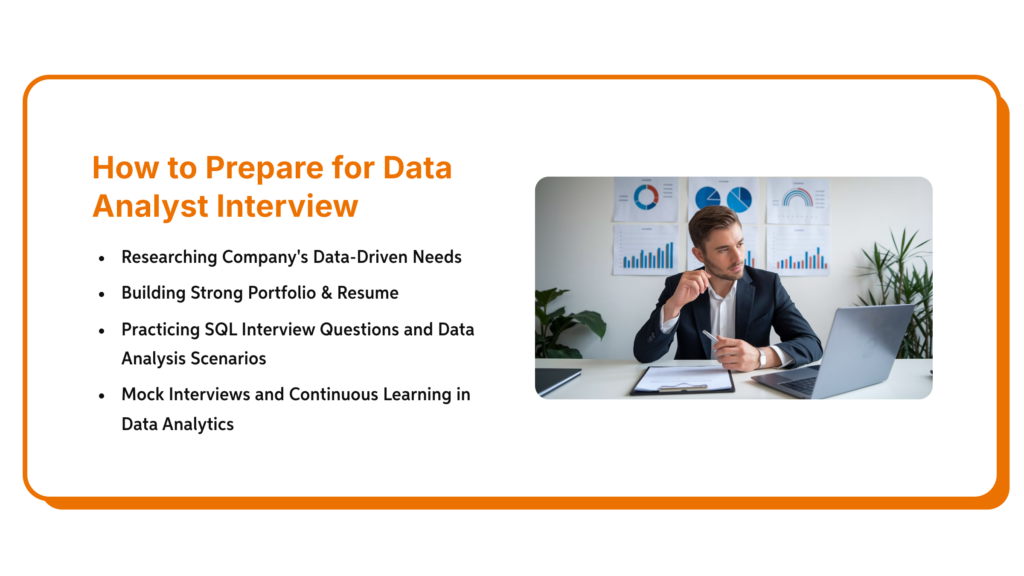
Quick Summary
Table of Contents
The demand for data analysts has skyrocketed as businesses rely more on data-driven decisions. This role is now essential in finance, healthcare, retail, and technology industries, where companies seek valuable insights from large datasets.
Preparing for data analyst interview questions is key to standing out in a competitive job market. Interviewers assess technical skills, business knowledge, and problem-solving abilities. Knowing common interview questions boosts confidence and readiness.
This article covers what to expect in data analyst interview questions, including general, technical, behavioral, and business-related questions and tips to help you prepare and succeed.
A well-structured answer should cover:
Highlight your analytical expertise, experience handling large datasets, and proficiency in SQL, Python, or Tableau tools. Keep your response concise and relevant to the role.
Your response should focus on:
A firm answer should showcase your enthusiasm for data-driven insights and ability to leverage analytical skills for business impact. Mention how you enjoy deriving meaningful conclusions from raw data and helping organizations make informed decisions.
Key responsibilities include:
A data analyst is crucial in transforming raw data into actionable insights. Employers seek candidates who can handle data preparation, exploratory analysis, and reporting using SQL, Python, Power BI, and Excel tools.
Ways to stay updated:
Continuous learning is key in the evolving field of data analytics. Candidates actively participating in open-source projects, online competitions, and professional forums demonstrate a strong commitment to professional growth.
Cleaning data is a key step in ensuring accurate analysis. First, I check for missing values and use methods like imputation (filling gaps with the mean, median, or mode). Next, I remove duplicates to avoid skewed results. Then, I standardize data for consistency across sources. Finally, I identify and handle outliers using techniques like Z-score or IQR. These steps help maintain data integrity, ensuring that insights are reliable and meaningful.
Keeping data clean and accurate is essential. I use methods like imputation to handle missing values, replacing them with appropriate statistics. For duplicate records, I remove them to prevent errors in analysis. Tools like Pandas, OpenRefine, and Excel functions make this process easier, ensuring the data is reliable for decision-making.
Descriptive analysis summarizes historical data, while inferential analysis tests hypotheses and makes predictions. Regression analysis predicts trends and clustering groups of similar data points using techniques like K-means, enhancing data-driven decision-making.
Statistical methods help derive insights by measuring central tendency with mean, median, and mode, identifying correlations using coefficients, and conducting hypothesis testing, such as A/B tests, to validate business decisions effectively.

Common SQL commands for data analysis include SELECT to retrieve data, JOIN to combine multiple tables, WHERE to filter results based on conditions, and GROUP BY to aggregate data for meaningful insights. These commands help in efficient data querying and analysis.
To optimize SQL queries, use indexes for faster searches, optimize JOIN operations to reduce processing time, avoid SELECT* queries for efficiency, and utilize EXPLAIN ANALYZE to debug and improve query performance.
Window functions perform calculations across related rows, including RANK(), DENSE_RANK(), LEAD(), and LAG().
Python is used for data manipulation with libraries like Pandas, NumPy, and Matplotlib. R is ideal for statistical computing, while SQL is essential for querying and managing databases efficiently in data analysis.
Libraries like Pandas, NumPy, and Matplotlib play a vital role in data analysis. Pandas help clean and organize data efficiently, NumPy handles complex calculations, and Matplotlib turns raw data into clear visuals. Together, they simplify data processing, making analysis easier to understand and more useful for decision-making.
Popular data visualization tools include Tableau for interactive visualizations, Power BI for business intelligence and reporting, and Excel Charts for essential data representation. These tools help analyze trends, patterns, and insights effectively for better decision-making.
When designing dashboards, key factors include clarity and simplicity for straightforward interpretation, selecting appropriate charts for accurate data representation, and incorporating interactive features like filters and drill-downs to enhance user engagement and usability.
Presenting data insights to a non-technical audience requires clear visuals, simple storytelling, and minimal jargon. The goal is to highlight key takeaways and actionable insights, ensuring clarity for better decision-making.
Understanding data analyst interview questions and techniques is essential. Candidates should stay updated on industry trends and strengthen their problem-solving skills to succeed in technical assessments and meet business needs.
In a data analyst interview questions round, behavioral and situational questions assess a candidate’s problem-solving ability, communication skills, and adaptability. Here are some common questions:
Working with difficult stakeholders is a common challenge in data analysis roles. A well-structured response should focus on:
For example, if a marketing manager insisted on a particular data interpretation, you could explain how you used data visualization tools like Tableau or Power BI to present alternative insights backed by statistical evidence, leading to an informed decision.
Data analysts often manage several projects simultaneously. To handle competing priorities:
A firm answer should highlight time management skills, efficiency in handling data analysis techniques, and the ability to deliver insights under pressure.
Errors in datasets can lead to misleading conclusions. A strong response should:
For example, if you found duplicate transactions in financial reports, you could explain how you used SQL techniques like GROUP BY and COUNT() to spot and fix the issue. This ensures accurate financial forecasting and prevents errors.
Preparing for data analyst interview questions helps candidates showcase their analytical thinking, problem-solving skills, and business understanding—all essential in today’s data-driven world.
Analytical thinking and problem-solving skills are critical for data analysts, who must interpret complex datasets and derive meaningful insights. Below are some key problem-solving questions that candidates may encounter in a data analyst interview questions.
Ensuring data accuracy is crucial in data analysis. Detect anomalies using SQL or Pandas, validate sources by cross-checking data points, and streamline processes with ETL pipelines. Collaboration with business and IT teams helps resolve inconsistencies, ensuring reliable, high-quality data for effective decision-making and strategic insights.
Handling incomplete data requires understanding its impact, using alternative sources, and applying statistical methods like imputation. Predictive analytics and historical trends help fill gaps while documenting assumptions ensures accuracy. For example, missing customer transaction data can be estimated using trend analysis and past behaviors to generate meaningful insights.
Measuring marketing campaign success involves tracking KPIs like conversion rate, CTR, ROI, customer retention, and engagement metrics (bounce rate, session duration). These indicators reveal user behavior, profitability, and long-term engagement. SQL queries and Python scripts help analyze trends, optimize strategies, and improve future marketing efforts based on data insights.
A/B testing helps make data-driven decisions by comparing two feature versions. First, define the goal, like improving the conversion rate. Then, randomly split users into control and test groups. Implement changes, analyze results using statistical tests, and conclude. For example, testing a new checkout page could track cart abandonment rate and transaction value for impact assessment.
Developing strong problem-solving skills and applying data analysis techniques effectively can help candidates demonstrate their ability to make informed decisions, troubleshoot data challenges, and drive business success in a data analyst interview questions round.
A successful data analyst possesses strong technical skills and understands how data aligns with broader business objectives. Some common data analyst interview questions assess business acumen and industry-specific knowledge.
Aligning data analysis with business objectives ensures actionable insights. Understanding KPIs like revenue growth, engaging stakeholders, and prioritizing data-driven decisions enhances effectiveness. Optimized dashboards using Tableau or Power BI to improve accessibility. For example, a retail analyst tracks regional sales to identify underperforming stores and refine marketing strategies. Preparing for data analyst interview questions helps demonstrate your ability to connect data insights with business impact, a crucial skill in data analytics roles.
Different industries rely on data analysis to make smarter decisions and improve efficiency. In e-commerce, businesses use cluster analysis to group customers, predictive analytics to forecast trends, and churn analysis to keep customers engaged. Healthcare applies predictive modeling to detect diseases early, assess patient risks, and optimize resources for better efficiency. Data analysis helps with fraud detection, credit risk assessment, and investment strategy optimization to reduce risks and increase financial returns.
Mastering data analysis techniques and understanding their real-world applications can help candidates stand out in data analyst interview questions round. Employers want professionals who can analyze numbers and connect them to business challenges and opportunities.
Supervised learning uses labeled data for tasks like classification and regression, while unsupervised learning identifies patterns in unlabeled data, such as clustering. Machine learning is widely used in data analysis for predictive modeling, customer segmentation, and fraud detection, enhancing decision-making and optimizing business strategies through data-driven insights.
Big Data tools like Hadoop and Spark help process massive datasets quickly and efficiently. They use distributed computing and parallel processing, making handling large amounts of data easier. Cloud platforms like AWS and Google Cloud provide the flexibility to scale as needed.
Techniques like data partitioning, indexing, and real-time analytics improve performance, ensuring businesses can gain insights faster.
Understanding big data tools and machine learning concepts is a massive advantage in data analyst interview questions. It shows you can work effectively with large datasets and turn raw data into meaningful business insights.
Succeeding in a data analyst interview questions involves technical skills, business knowledge, and clear communication. Here’s how to prepare effectively:

Start by researching the company’s industry, competitors, and data challenges. Understanding how they use data analysis will help you tailor your answers and highlight relevant skills. This shows interviewers that you’re not just technically skilled but also business-savvy.
A well-organized portfolio can set you apart. Showcase past projects where you used SQL for data queries, Python for analysis, and Tableau for visualizations. Highlight skills like data cleaning, statistical modeling, and business impact to prove your ability to turn raw data into meaningful insights.
Many interview questions for data analyst roles focus on SQL queries and problem-solving scenarios. Practice common SQL interview questions like JOINS, window functions, and query optimization. Additionally, work on case studies involving real-world data analysis techniques.
Practice mock interviews to sharpen your problem-solving skills and improve communication. Stay current with data analytics trends by taking online courses and working on real-world projects using platforms like Kaggle.
With the proper preparation, you’ll confidently showcase your data-driven decision-making skills, increasing your chances of success in a data analyst interview questions set.
Landing a data analyst job requires a mix of technical skills, problem-solving abilities, and business understanding. To stand out, focus on common data analyst interview questions, SQL queries, and real-world data analysis techniques.
Since data analytics is constantly evolving, continuous learning is essential. Stay updated on industry trends, take online courses, and work on hands-on projects. Platforms like Kaggle, GitHub, and online communities help you showcase your skills and connect with professionals.
By gaining experience in SQL, Python, and data visualization tools, you’ll build the confidence needed to excel in interviews and secure a rewarding career in data analytics.
Also Read: What is a Data Analyst?
To prepare for data analyst interview questions, master SQL, Python, and data visualization tools. Practice data cleaning, analysis, and reporting to strengthen your skills. Research the company’s industry and data challenges, build a strong portfolio, and participate in mock interviews. Stay updated with industry trends, take online courses, and work on real-world projects to refine your expertise and boost interview confidence.
Each type helps businesses make informed, data-driven decisions.
Descriptive Analyst – Summarizes past data for insights.
Diagnostic Analyst – Identifies reasons behind trends.
Predictive Analyst – Uses machine learning to forecast outcomes.
Prescriptive Analyst – Provides recommendations based on data insights.
Ask about team structure, data sources, tools used, and key challenges. Inquire about growth opportunities, expectations, and how data supports business goals. Example: “What are the biggest data challenges your team faces?” or “How does the company use data to drive decision-making?”
Define the objective – Understand the problem.
Collect data – Gather relevant datasets.
Clean data – Handle missing values and remove duplicates.
Analyze data – Apply statistical methods.
Interpret results – Extract meaningful insights.
Visualize data – Use charts and dashboards.
Make decisions – Implement data-driven solutions.
A data analyst collects, cleans, and interprets data to help businesses make informed decisions. They use SQL, Python, Excel, and visualization tools to uncover trends, optimize operations, and support strategic planning. Their insights improve efficiency, profitability, and customer experience across industries.

Authored by, Amay Mathur | Senior Editor




Amay Mathur is a business news reporter at Chegg.com. He previously worked for PCMag, Business Insider, The Messenger, and ZDNET as a reporter and copyeditor. His areas of coverage encompass tech, business, strategy, finance, and even space. He is a Columbia University graduate.
Editor's Recommendations
Chegg India does not ask for money to offer any opportunity with the company. We request you to be vigilant before sharing your personal and financial information with any third party. Beware of fraudulent activities claiming affiliation with our company and promising monetary rewards or benefits. Chegg India shall not be responsible for any losses resulting from such activities.
Chegg India does not ask for money to offer any opportunity with the company. We request you to be vigilant before sharing your personal and financial information with any third party. Beware of fraudulent activities claiming affiliation with our company and promising monetary rewards or benefits. Chegg India shall not be responsible for any losses resulting from such activities.